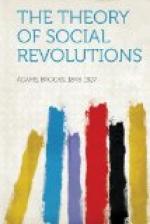Danton explained in the Convention that it was because of the deep distrust of the judiciary in the public mind, which this anecdote shows, that the September massacres occurred, and it was because all republicans knew that the state and the army were full of traitors like Dumouriez, whom the ordinary courts would not punish, that Danton brought forward his bill to organize a true political tribunal to deal with them summarily. When Danton carried through this statute he supposed himself to be at the apex of power and popularity, and to be safe, if any man in France were safe. Very shortly he learned the error In his calculation. Billaud was a member of the Committee of Public Safety, while Danton had allowed himself to be dropped from membership. Danton had just been married, and to an aristocratic wife, and the turmoil of office had grown to be distasteful to him. On March 30, 1794, Billaud somewhat casually remarked, “We must kill Danton;” for in truth Danton, with conservative leanings, was becoming a grave danger to the extreme Jacobins. Had he lived a few months longer he would have been a Thermidorist. Billaud, therefore, only expressed the prevailing Jacobin opinion; so the Jacobins arrested Danton, Camille Desmoulins, and his other friends, and Danton at once anticipated what would be his doom. As he entered his cell he said to his jailer: “I erected the Tribunal. I ask pardon of God and men.” But even yet he did not grasp the full meaning of what he had done. At his trial he wished to introduce his evidence fully, protesting “that he should understand the Tribunal since he created it;” nevertheless, he did not understand the Tribunal, he still regarded it as more or less a court. Topino-Lebrun, the artist, did understand it. Topino sat on the jury which tried Danton, and observed that the heart of one of his colleagues seemed failing him. Topino took the waverer aside, and said: “This is not a trial, it is a measure. Two men are impossible; one must perish. Will you kill Robespierre?—No.—Then by that admission you condemn Danton.” Lebrun in these few words went to the root of the matter, and stated the identical principle which underlies our whole doctrine of the Police Power. A political court is not properly a court at all, but an administrative board whose function is to work the will of the dominant faction for the time being. Thus a political court becomes the most formidable of all engines for the destruction of its creators the instant the social equilibrium shifts. So Danton found, in the spring of 1794, when the equilibrium shifted; and so Robespierre, who slew Danton, found the next July, when the equilibrium shifted again.




